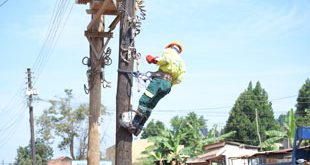Slavery in America may have ended but the US state has reproduced it through mass incarceration of blacks and police violence in poor black communities due to its hidden economic gains
THE LAST WORD: By Andrew M. Mwenda
Recent events in the United States; where police shot and killed two black men in cold blood may have dominated the news but they are actually normal and regular. What was unusual was a lone black man who decided to take matters into his hands and strike back at America’s institutionalised system of racial subjugation and violence, killing five police officers and injuring seven more. Since then, there has been more outpouring of sympathy for the police, including from President Barack Obama, than to the daily victims of police terror.
When I was young and naïve, I was like many Africans, holding an idealised view of America as a nation that stands for democracy and human rights. As I grew older, lived in America and read extensively about racial issues in that country, I learnt that racial injustice against poor black people is a deeply rooted aspect of American life. Although police are the violent face of this racist state, racial subjugation is a bipartisan political strategy that is largely implemented through the American criminal justice system.
Widespread and blatant racial injustice has survived in America for over 400 years only because it is the logic of the state and its political and economic calculus. Its name and form have changed over time – from indentured servitude, to slavery, to Jim Crow (America’s name for apartheid), and now to mass incarceration. But its substance has remained the same. In spite of the different guises, racial subjugation relies on America’s democratic institutions to keep black people as a racial under-caste.
This indictment of America may sound harsh because that country has also produced Oprah Winfrey, Colin Powell, Barack Obama, Condoleeza Rice, Will Smith, Kobe Bryant, Denzel Washington, etc. If the American system can allow such black people to emerge and succeed, some people argue, surely the nation cannot be accused of being built on the subjugation of black people.
However, we must remember that in spite of slavery and Jim Crow, America produced many great blacks: Anthony Johnson, Samuel Francis (a rich businessman and friend of America’s founding father, George Washington), John Baptiste De’Sable (the man who founded Chicago in 1772), Granville Woods (called the “black Edison” for patenting the induction telegram system), Frederick Douglas, Jack Johnson (the first African American to win the world boxing heavyweight championship of the world), Ralph Bunche (winner of the Nobel Peace Prize in 1950) etc.
Yet the emergence of people like Obama at the top of the American system is the way the system legitimises its violence against black people. By allowing these few blacks to succeed against insurmountable odds (which they do by internalising white superiority and how to work around it to their benefit) these few blacks create the wrong impression that America is a post-racial society. Indeed these cosmetic black achievements may be the real impediment to dismantling the American racial caste system.
When people see police stalking black neighborhoods, stopping and searching black people and rounding them off to jail, they think America is fighting crime. Yet the U.S. criminal justice system is not a system of crime prevention and control but of racial subjugation and social control.
Let me first give the facts before analysing their implications. In that self-acclaimed democracy of high civic and moral values, a black man is killed by a highly militarised and racist police force every 28 hours – yes, every 28 hours. Today in 2016, there are more black people in the prisons of America than were enslaved in 1865 when the Emancipation Proclamation was issued. Today in 2016, there are more black people who are disenfranchised (denied voting rights) than in 1870 when the 15th amendment prohibiting discrimination in voting rights based on race was passed.
Today in 2016, there are more black youth in prison than in college. For example, in 1999 in the state of Illinois, 902 blacks graduated from college; 7,000 graduated from its state prisons. In Chicago, the hometown of America’s first black president, 80% of the adult black male population has a criminal record. A black child in America today has less chance of being raised by both parents than under slavery. Today 70% of professional U.S. black women are not married because mass incarceration of black males has taken them out of the dating pool. The incarceration rate of black people in America today is ten times higher than in apartheid South Africa.
I can go on listing these tragic facts ad infinitum. Last week Obama read another long list of these racial biases in police stops, searches, seizures, arrests, sentencing etc. that I should not belabor them here. The aim of this article is to show that the political superstructure of America and the economic base on which it rests are both sustained and reproduced by this system of racial subjugation. To understand this system, we need to appreciate the fact that crime in America has a color – it is black.
Black people constitute about 10% of the U.S. population but over 50% of its prison population. Media talking heads in USA claim that this is because of violent crime in black communities. Yet 75% of blacks are in jail for drugs and study after study has shown that blacks and whites sell and use drugs at the same rates. In his book, `When Work Disappears’, William Julius Wilson found that after controlling unemployment, the differences in crime rates between white and black communities disappear.
 The Independent Uganda: You get the Truth we Pay the Price
The Independent Uganda: You get the Truth we Pay the Price




strong and passionate argument you make Andrew. I would have it differently though. That capitalism is a caste (racial) system. I will borrow from your very source of William Julius Wilson, that after controlling unemployment, the differences in crime rates between white and black communities disappeared. A similar story has been told in Rwanda (Okweitura) where Hutus bought royalty by amassing wealth yet the Tutsi where relegated to the social status as that of the Hutu because of their poor economic standings (heard of the “moderate Hutu?”) I have lived in both the U.K and U.S and a homeless white would suffer the safe consequences as the homeless black.
Andrew, you make some very nice points, but racial relations in America are more complex than these simplistic and lacking in detail historical descriptions. 1) Yes, there are flaws in the American Democratic system, but to fill your write-up with these nuggets of truth really downplays the complexity of racial relations. 2) Your major premise is flawed and needs rethinking. There are multiple perspectives that can explain black crime and its evolution.
We have a tendency to hide behind the atatement “its more complex that that”… Please Tonny, tell us these “complexities”, in detail. We have the capacity to grasp them… Let them not be excuses for avoiding discussion.
Allan: I appreciate your comment. I am a regular at a conference series entitled “Race, ethnicity, and place (http://rep-conference.binghamton.edu/),” which opened my eyes and refocused my thinking. For context and additional discourse, please review the following perspectives: conflict theory, strain theory, social disorganization theory, macrostructural opportunity theory, social control theory, subculture of violence theory, and prosecutorial and police discrimination theory. Some references: Mass imprisonment and the life course: Race and class inequality in US incarceration by Pettit and Western 2004, American Sociological Review 69(2):151-169; Extremely disadvantaged neighborhoods and urban crime by Krivo and Peterson 1996, Social Forces 75(2):619-648; Social anatomy of racial and ethnic disparities in violence by Sampson et al 2005, AJPH 95(2):224-232; Structural variations in juvenile-court processing: inequality, the underclass, and social-control by Sampson and Laub 1993, Law and Society Review 27(2): 285-311.
You also remind Andrew that what he puts on paper becomes a fact only wen there’s a cited credible source, and not a single author of a single book.
What is complicated about racism and the discrimination of blacks in America is the systems, institutions and political tactics employed to make it thrive. Otherwise Its not that complicated to deduce that the current state of blacks in America is directly related to their experience of plunder , terrorism and deprivation through State agency for the benefit of whites based solely on skin color- nothing complicated about that!
Great points raised here. I also think that America has not done enough to stop this war on racism.
1.How come within a short time the biggest tax payers like Roofings,Ruperelia Group are now asking to be bailed out?
2.There are development partners like ADB,EADB that fund projects and charge reasonable interest rates why did they opt for local banks that charge high interest rates?
3.An independent audit firm should carry out an audit on theses firms before they are bailed out just to ascertain their worth e.g i was shocked to hear that Good African Coffee failed to supply coffee in Europe.this would not have happened if the coffee was being suplied by a country as opposed to an indivudal.